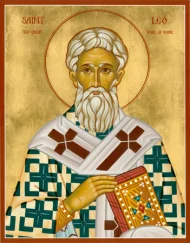 The pre-eternal, uncircumscribed and almighty Logos and omnipotent Son of God could clearly have saved man from mortality and servitude to the devil without Himself becoming man.
The pre-eternal, uncircumscribed and almighty Logos and omnipotent Son of God could clearly have saved man from mortality and servitude to the devil without Himself becoming man.
He upholds all things by the word of His power and everything is subject to His divine authority….
But the incarnation of the Logos of God was the method of deliverance most in keeping with our nature and weakness, and most appropriate for Him who carried it out, for this method had justice on its side, and God does not act without justice….
Man…had voluntarily approached the originator of evil, obeyed him when he treacherously advised the opposite of what God had commanded, and was justly given over to him.
In this way, through the evil one’s envy and the good Lord’s just consent, death became twofold, for he brought about not just physical but also eternal death.
Christ clearly had to make immortal not only the human nature which existed in Him, but the human race, and to guide it towards participating in that true life which in due course procures eternal life for the body as well, just as the soul’s state of death in due course brought about the death of the body too.
That this plan for salvation should be made manifest, and that Christ’s way of life should be put before us to emulate, was highly necessary and beneficial.
At one time God appeared visibly before man and the good angels that they might imitate Him.
Later, when we had cast ourselves down and fallen away from this vision, God came down to us from on high in His surpassing love for mankind, without in any way giving up His divinity, and by living among us set Himself before us as the pattern of the way back to life.
O the depth of the riches both of the wisdom and love of God! In His wisdom, power and love for mankind God knew how to transform incomparably for the better the falls resulting from our self-willed waywardness.
If the Son of God had not come down from heaven we should have had no hope of going up to heaven. If He had not become incarnate, suffered in the flesh, risen and ascended for our sake, we should not have known God’s surpassing love for us.
If He had not taken flesh and endured the passion while we were still ungodly, we should not have desisted from the pride which so often lifts us up and drags us down.
Now that we have been exalted without contributing anything, we stay humble, and as we regard with understanding the greatness of God’s promise and benevolence we grow in humility, from which comes salvation.
Gregory Palamas (1296-1359): Homily on Great and Holy Saturday, from Saint Gregory Palamas: The Homilies (Mount Thabor Publishing, 2009) @Kandylaki (fuller version).









[…] From St. Gregory Palamas: […]